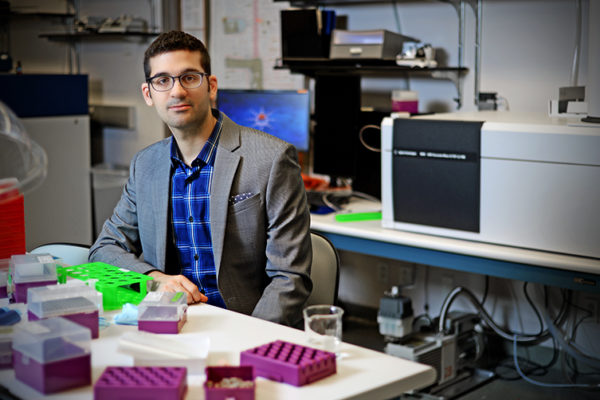Metabolomics for the masses
Gary Patti, the Michael and Tana Powell Professor of Chemistry in Arts & Sciences at Washington University in St. Louis, has been awarded $4.8 million in two separate National Institutes of Health (NIH) grants focused on improving the accessibility of metabolomics — the study of the biochemical reactions that underlie metabolism.
Scientists characterize protein essential to survival of malaria parasite
A biology lab at Washington University in St. Louis has successfully cracked the structure of an enzyme made by Plasmodium falciparum, the parasitical protozoan that causes the most lethal form of malaria. Plasmodium cannot live without the enzyme, which is uses to make cell membrane. Because people don’t make this enzyme, it is an ideal target for an anti-malarial drug. Such a drug might kill Plasmodium but have minimal side effects for people.
Biologists’ favorite worm gets viruses
A workhorse of modern biology is sick, and scientists couldn’t be happier. Researchers at Washington University School of Medicine in St. Louis and other institutions have found that the nematode C. elegans, a millimeter-long worm used extensively for decades to study many aspects of biology, gets naturally occurring viral infections.
Nobel Prize recipient Sydney Brenner to discuss ‘Humanity’s Genes’
Nobel Prize-winning biologist Sydney Brenner will deliver the annual Arthur Holly Compton Memorial Lecture for the Assembly Series at 4 p.m. Tues, Oct. 14. The lecture,”Humanity’s Genes,” is free and open to the public and will be held in Graham Chapel, located just north of Mallinckrodt Center (6445 Forsyth Blvd.) on the Washington University campus. Brenner’s lecture will discuss some of the questions raised by the completion of the Human Genome Project. He will talk about both the benefits and the fears raised by recent breakthroughs in genetic research, and his belief that the brain is mightier than the genome.

